A Critical Analysis of US Policy During the First World War
VerifiedAdded on 2022/08/25
|9
|2383
|27
Essay
AI Summary
This essay critically analyzes the foreign policy of the United States during the First World War, examining the shift from initial neutrality to active intervention. It explores the economic motivations behind the US's early stance, including extensive trade relations with both sides of the conflict. The essay further investigates the political pressures from Britain and within the US, as well as the ideological considerations related to democracy and human rights, that ultimately led to the US's entry into the war. The essay highlights how the US's commitment to safeguarding its trade interests, combined with the evolving dynamics of the war and the desire to protect democratic values, reshaped its foreign policy. The analysis covers key events and figures, providing a comprehensive understanding of the US's role in WWI and its implications. The conclusion summarizes the key arguments, emphasizing the complexities of US foreign policy and its transformation during the war.

Title:
Name of the student:
Name of the university:
Authors note:
Name of the student:
Name of the university:
Authors note:
Paraphrase This Document
Need a fresh take? Get an instant paraphrase of this document with our AI Paraphraser
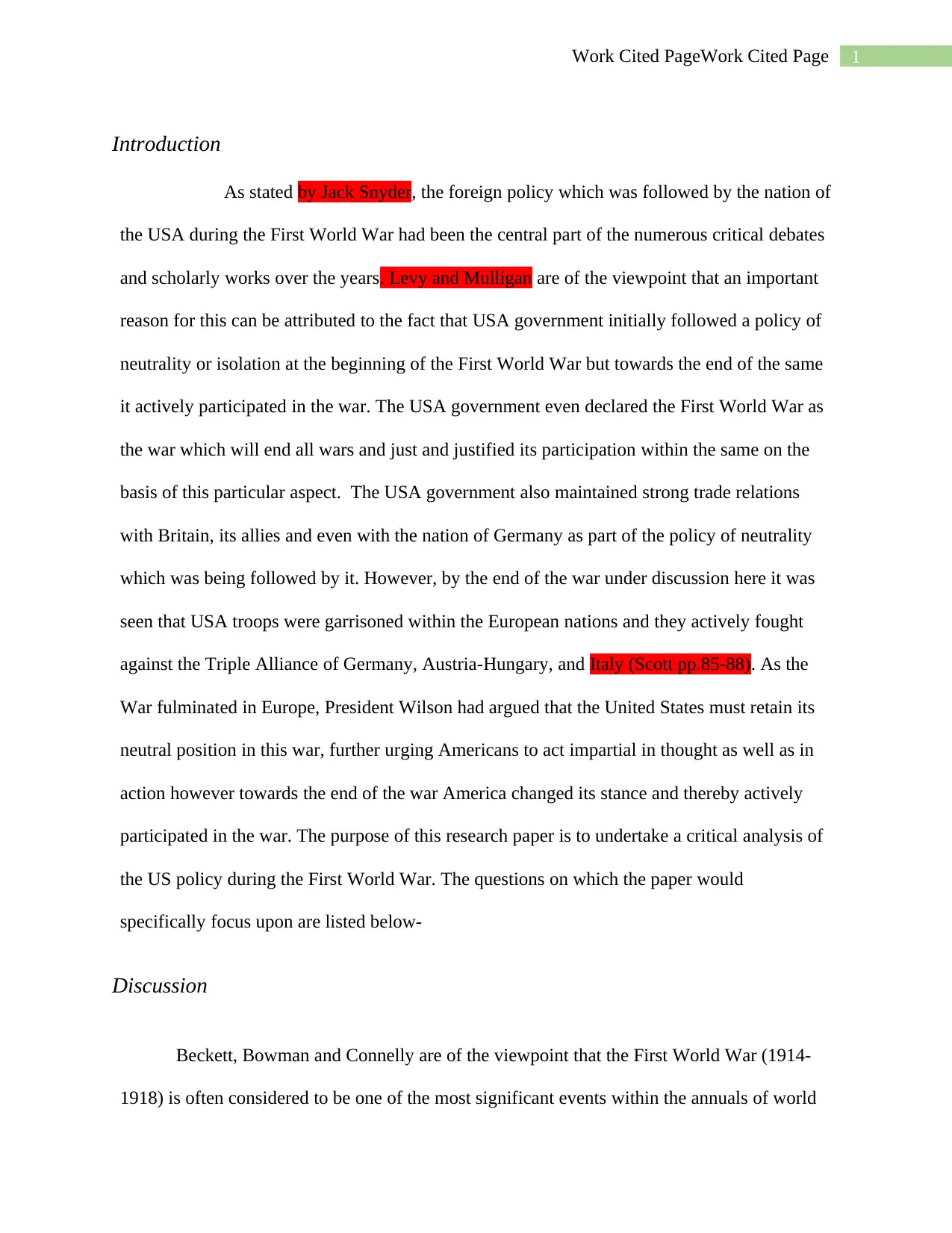
1Work Cited PageWork Cited Page
Introduction
As stated by Jack Snyder, the foreign policy which was followed by the nation of
the USA during the First World War had been the central part of the numerous critical debates
and scholarly works over the years. Levy and Mulligan are of the viewpoint that an important
reason for this can be attributed to the fact that USA government initially followed a policy of
neutrality or isolation at the beginning of the First World War but towards the end of the same
it actively participated in the war. The USA government even declared the First World War as
the war which will end all wars and just and justified its participation within the same on the
basis of this particular aspect. The USA government also maintained strong trade relations
with Britain, its allies and even with the nation of Germany as part of the policy of neutrality
which was being followed by it. However, by the end of the war under discussion here it was
seen that USA troops were garrisoned within the European nations and they actively fought
against the Triple Alliance of Germany, Austria-Hungary, and Italy (Scott pp.85-88). As the
War fulminated in Europe, President Wilson had argued that the United States must retain its
neutral position in this war, further urging Americans to act impartial in thought as well as in
action however towards the end of the war America changed its stance and thereby actively
participated in the war. The purpose of this research paper is to undertake a critical analysis of
the US policy during the First World War. The questions on which the paper would
specifically focus upon are listed below-
Discussion
Beckett, Bowman and Connelly are of the viewpoint that the First World War (1914-
1918) is often considered to be one of the most significant events within the annuals of world
Introduction
As stated by Jack Snyder, the foreign policy which was followed by the nation of
the USA during the First World War had been the central part of the numerous critical debates
and scholarly works over the years. Levy and Mulligan are of the viewpoint that an important
reason for this can be attributed to the fact that USA government initially followed a policy of
neutrality or isolation at the beginning of the First World War but towards the end of the same
it actively participated in the war. The USA government even declared the First World War as
the war which will end all wars and just and justified its participation within the same on the
basis of this particular aspect. The USA government also maintained strong trade relations
with Britain, its allies and even with the nation of Germany as part of the policy of neutrality
which was being followed by it. However, by the end of the war under discussion here it was
seen that USA troops were garrisoned within the European nations and they actively fought
against the Triple Alliance of Germany, Austria-Hungary, and Italy (Scott pp.85-88). As the
War fulminated in Europe, President Wilson had argued that the United States must retain its
neutral position in this war, further urging Americans to act impartial in thought as well as in
action however towards the end of the war America changed its stance and thereby actively
participated in the war. The purpose of this research paper is to undertake a critical analysis of
the US policy during the First World War. The questions on which the paper would
specifically focus upon are listed below-
Discussion
Beckett, Bowman and Connelly are of the viewpoint that the First World War (1914-
1918) is often considered to be one of the most significant events within the annuals of world
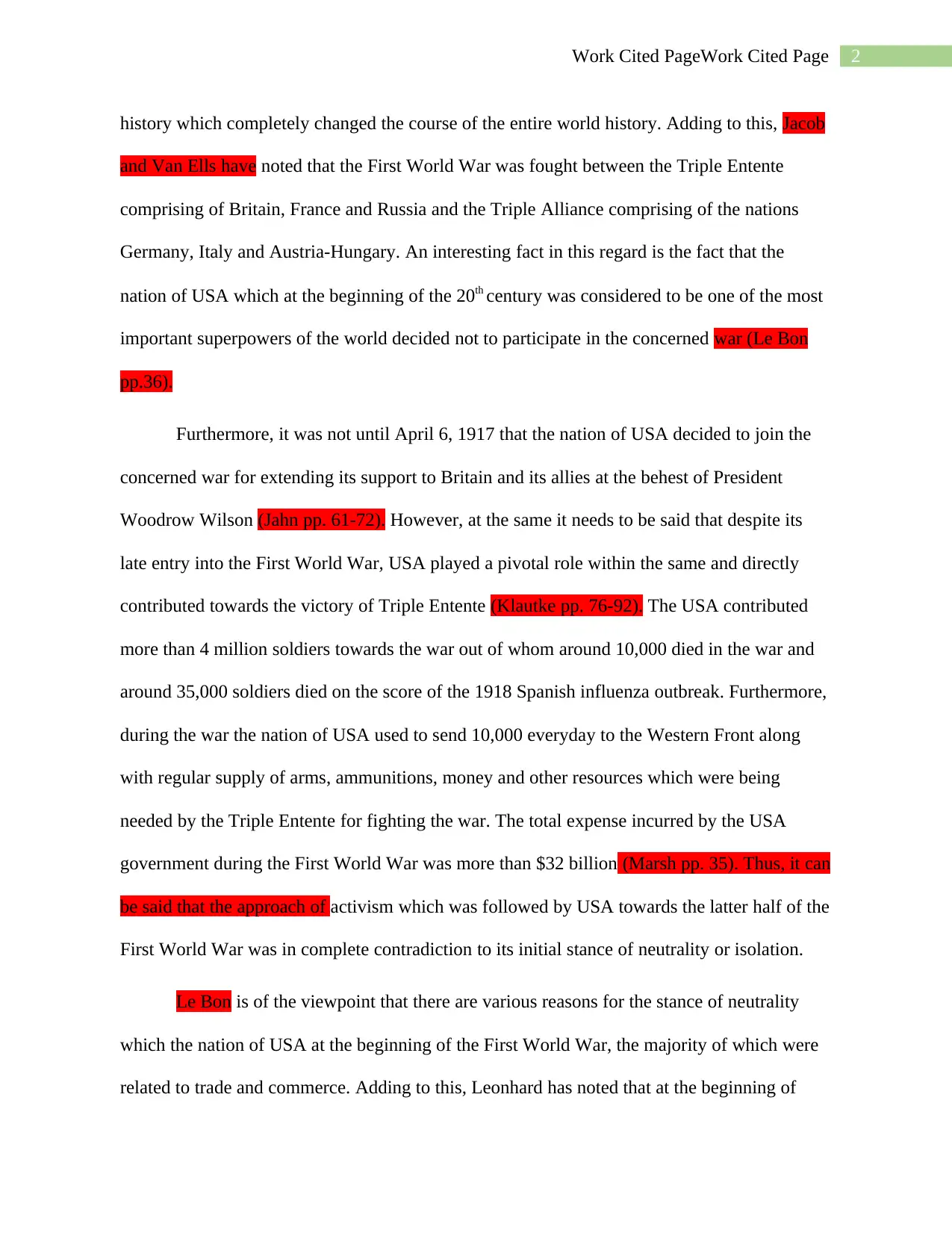
2Work Cited PageWork Cited Page
history which completely changed the course of the entire world history. Adding to this, Jacob
and Van Ells have noted that the First World War was fought between the Triple Entente
comprising of Britain, France and Russia and the Triple Alliance comprising of the nations
Germany, Italy and Austria-Hungary. An interesting fact in this regard is the fact that the
nation of USA which at the beginning of the 20th century was considered to be one of the most
important superpowers of the world decided not to participate in the concerned war (Le Bon
pp.36).
Furthermore, it was not until April 6, 1917 that the nation of USA decided to join the
concerned war for extending its support to Britain and its allies at the behest of President
Woodrow Wilson (Jahn pp. 61-72). However, at the same it needs to be said that despite its
late entry into the First World War, USA played a pivotal role within the same and directly
contributed towards the victory of Triple Entente (Klautke pp. 76-92). The USA contributed
more than 4 million soldiers towards the war out of whom around 10,000 died in the war and
around 35,000 soldiers died on the score of the 1918 Spanish influenza outbreak. Furthermore,
during the war the nation of USA used to send 10,000 everyday to the Western Front along
with regular supply of arms, ammunitions, money and other resources which were being
needed by the Triple Entente for fighting the war. The total expense incurred by the USA
government during the First World War was more than $32 billion (Marsh pp. 35). Thus, it can
be said that the approach of activism which was followed by USA towards the latter half of the
First World War was in complete contradiction to its initial stance of neutrality or isolation.
Le Bon is of the viewpoint that there are various reasons for the stance of neutrality
which the nation of USA at the beginning of the First World War, the majority of which were
related to trade and commerce. Adding to this, Leonhard has noted that at the beginning of
history which completely changed the course of the entire world history. Adding to this, Jacob
and Van Ells have noted that the First World War was fought between the Triple Entente
comprising of Britain, France and Russia and the Triple Alliance comprising of the nations
Germany, Italy and Austria-Hungary. An interesting fact in this regard is the fact that the
nation of USA which at the beginning of the 20th century was considered to be one of the most
important superpowers of the world decided not to participate in the concerned war (Le Bon
pp.36).
Furthermore, it was not until April 6, 1917 that the nation of USA decided to join the
concerned war for extending its support to Britain and its allies at the behest of President
Woodrow Wilson (Jahn pp. 61-72). However, at the same it needs to be said that despite its
late entry into the First World War, USA played a pivotal role within the same and directly
contributed towards the victory of Triple Entente (Klautke pp. 76-92). The USA contributed
more than 4 million soldiers towards the war out of whom around 10,000 died in the war and
around 35,000 soldiers died on the score of the 1918 Spanish influenza outbreak. Furthermore,
during the war the nation of USA used to send 10,000 everyday to the Western Front along
with regular supply of arms, ammunitions, money and other resources which were being
needed by the Triple Entente for fighting the war. The total expense incurred by the USA
government during the First World War was more than $32 billion (Marsh pp. 35). Thus, it can
be said that the approach of activism which was followed by USA towards the latter half of the
First World War was in complete contradiction to its initial stance of neutrality or isolation.
Le Bon is of the viewpoint that there are various reasons for the stance of neutrality
which the nation of USA at the beginning of the First World War, the majority of which were
related to trade and commerce. Adding to this, Leonhard has noted that at the beginning of
⊘ This is a preview!⊘
Do you want full access?
Subscribe today to unlock all pages.

Trusted by 1+ million students worldwide
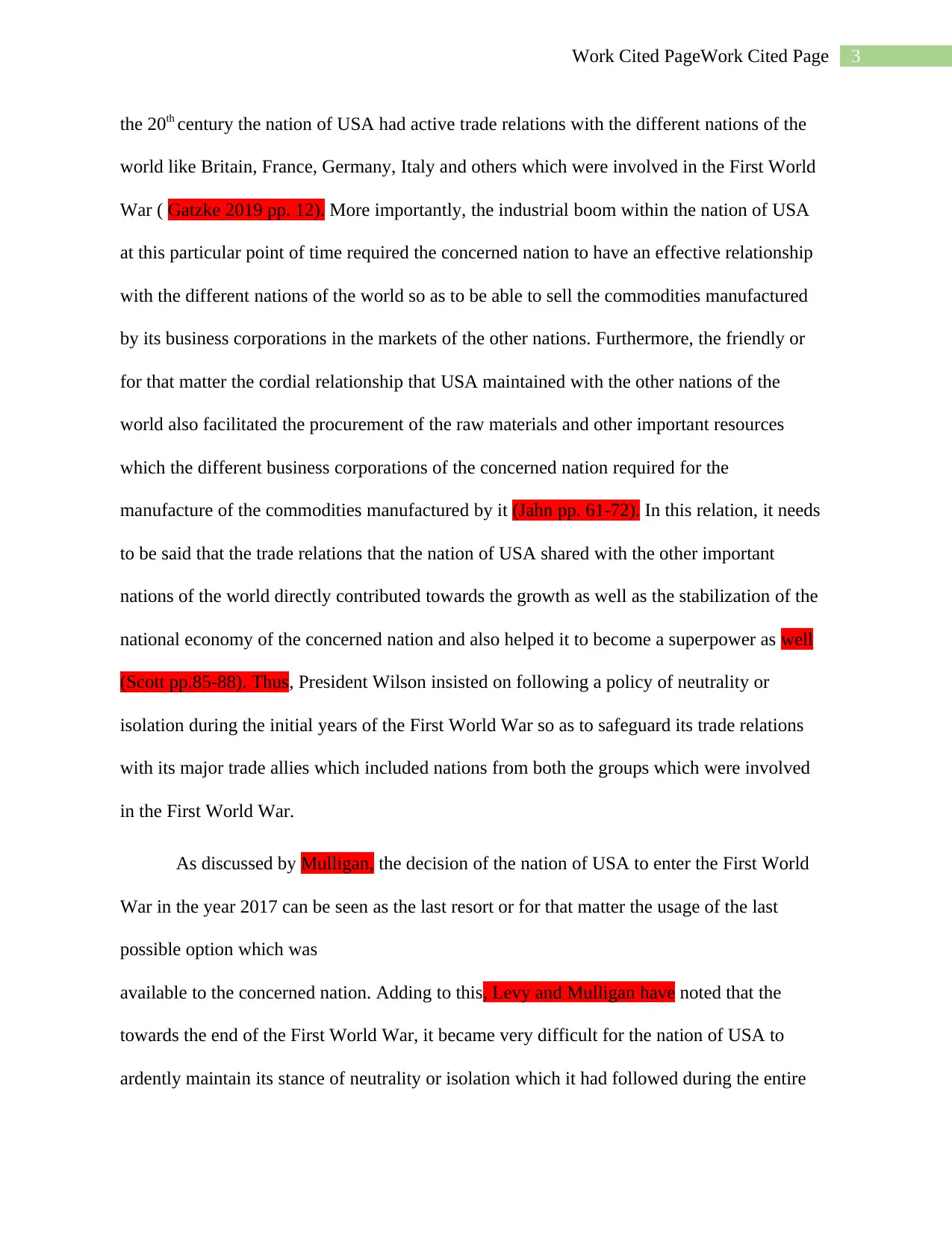
3Work Cited PageWork Cited Page
the 20th century the nation of USA had active trade relations with the different nations of the
world like Britain, France, Germany, Italy and others which were involved in the First World
War ( Gatzke 2019 pp. 12). More importantly, the industrial boom within the nation of USA
at this particular point of time required the concerned nation to have an effective relationship
with the different nations of the world so as to be able to sell the commodities manufactured
by its business corporations in the markets of the other nations. Furthermore, the friendly or
for that matter the cordial relationship that USA maintained with the other nations of the
world also facilitated the procurement of the raw materials and other important resources
which the different business corporations of the concerned nation required for the
manufacture of the commodities manufactured by it (Jahn pp. 61-72). In this relation, it needs
to be said that the trade relations that the nation of USA shared with the other important
nations of the world directly contributed towards the growth as well as the stabilization of the
national economy of the concerned nation and also helped it to become a superpower as well
(Scott pp.85-88). Thus, President Wilson insisted on following a policy of neutrality or
isolation during the initial years of the First World War so as to safeguard its trade relations
with its major trade allies which included nations from both the groups which were involved
in the First World War.
As discussed by Mulligan, the decision of the nation of USA to enter the First World
War in the year 2017 can be seen as the last resort or for that matter the usage of the last
possible option which was
available to the concerned nation. Adding to this, Levy and Mulligan have noted that the
towards the end of the First World War, it became very difficult for the nation of USA to
ardently maintain its stance of neutrality or isolation which it had followed during the entire
the 20th century the nation of USA had active trade relations with the different nations of the
world like Britain, France, Germany, Italy and others which were involved in the First World
War ( Gatzke 2019 pp. 12). More importantly, the industrial boom within the nation of USA
at this particular point of time required the concerned nation to have an effective relationship
with the different nations of the world so as to be able to sell the commodities manufactured
by its business corporations in the markets of the other nations. Furthermore, the friendly or
for that matter the cordial relationship that USA maintained with the other nations of the
world also facilitated the procurement of the raw materials and other important resources
which the different business corporations of the concerned nation required for the
manufacture of the commodities manufactured by it (Jahn pp. 61-72). In this relation, it needs
to be said that the trade relations that the nation of USA shared with the other important
nations of the world directly contributed towards the growth as well as the stabilization of the
national economy of the concerned nation and also helped it to become a superpower as well
(Scott pp.85-88). Thus, President Wilson insisted on following a policy of neutrality or
isolation during the initial years of the First World War so as to safeguard its trade relations
with its major trade allies which included nations from both the groups which were involved
in the First World War.
As discussed by Mulligan, the decision of the nation of USA to enter the First World
War in the year 2017 can be seen as the last resort or for that matter the usage of the last
possible option which was
available to the concerned nation. Adding to this, Levy and Mulligan have noted that the
towards the end of the First World War, it became very difficult for the nation of USA to
ardently maintain its stance of neutrality or isolation which it had followed during the entire
Paraphrase This Document
Need a fresh take? Get an instant paraphrase of this document with our AI Paraphraser
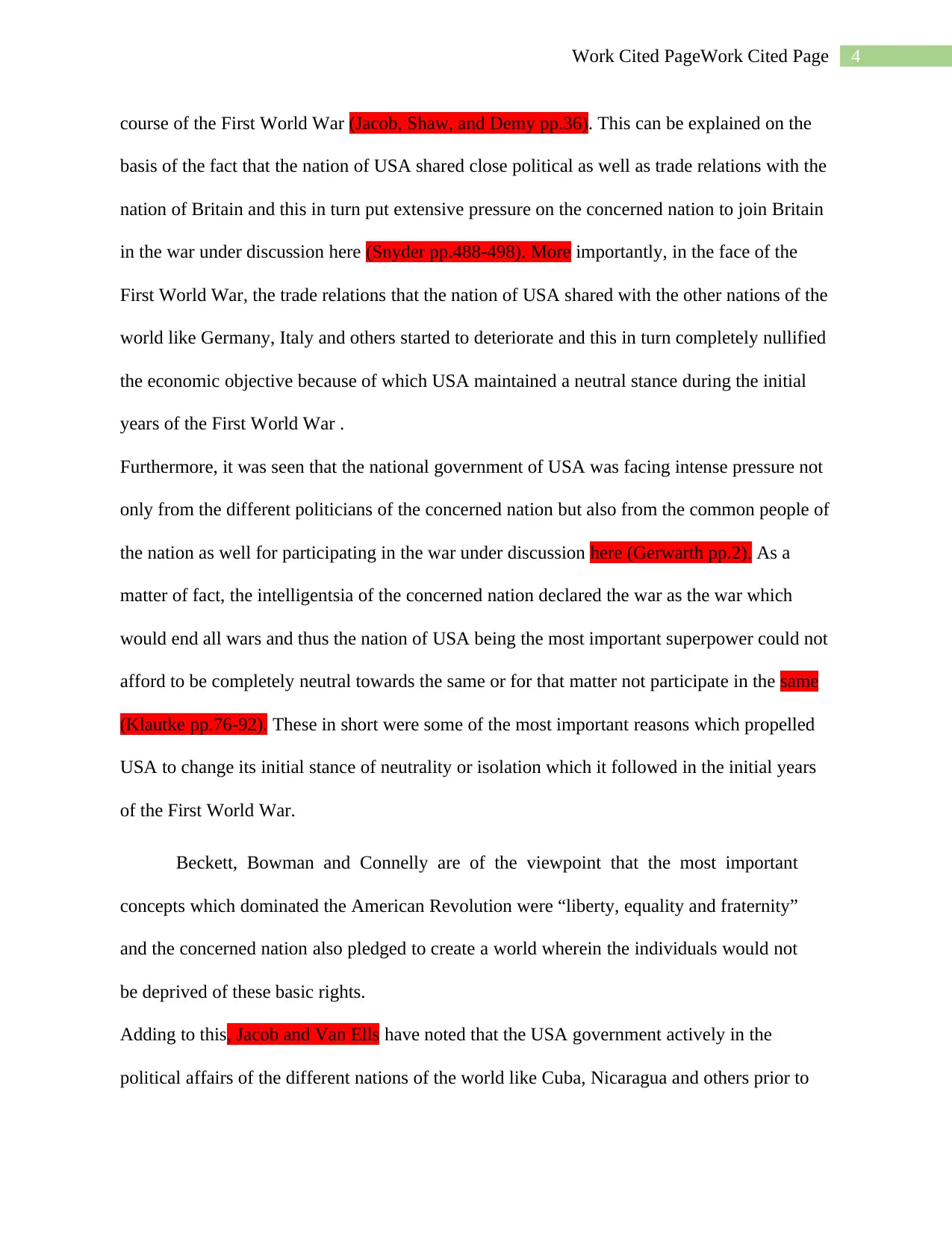
4Work Cited PageWork Cited Page
course of the First World War (Jacob, Shaw, and Demy pp.36). This can be explained on the
basis of the fact that the nation of USA shared close political as well as trade relations with the
nation of Britain and this in turn put extensive pressure on the concerned nation to join Britain
in the war under discussion here (Snyder pp.488-498). More importantly, in the face of the
First World War, the trade relations that the nation of USA shared with the other nations of the
world like Germany, Italy and others started to deteriorate and this in turn completely nullified
the economic objective because of which USA maintained a neutral stance during the initial
years of the First World War .
Furthermore, it was seen that the national government of USA was facing intense pressure not
only from the different politicians of the concerned nation but also from the common people of
the nation as well for participating in the war under discussion here (Gerwarth pp.2). As a
matter of fact, the intelligentsia of the concerned nation declared the war as the war which
would end all wars and thus the nation of USA being the most important superpower could not
afford to be completely neutral towards the same or for that matter not participate in the same
(Klautke pp.76-92). These in short were some of the most important reasons which propelled
USA to change its initial stance of neutrality or isolation which it followed in the initial years
of the First World War.
Beckett, Bowman and Connelly are of the viewpoint that the most important
concepts which dominated the American Revolution were “liberty, equality and fraternity”
and the concerned nation also pledged to create a world wherein the individuals would not
be deprived of these basic rights.
Adding to this, Jacob and Van Ells have noted that the USA government actively in the
political affairs of the different nations of the world like Cuba, Nicaragua and others prior to
course of the First World War (Jacob, Shaw, and Demy pp.36). This can be explained on the
basis of the fact that the nation of USA shared close political as well as trade relations with the
nation of Britain and this in turn put extensive pressure on the concerned nation to join Britain
in the war under discussion here (Snyder pp.488-498). More importantly, in the face of the
First World War, the trade relations that the nation of USA shared with the other nations of the
world like Germany, Italy and others started to deteriorate and this in turn completely nullified
the economic objective because of which USA maintained a neutral stance during the initial
years of the First World War .
Furthermore, it was seen that the national government of USA was facing intense pressure not
only from the different politicians of the concerned nation but also from the common people of
the nation as well for participating in the war under discussion here (Gerwarth pp.2). As a
matter of fact, the intelligentsia of the concerned nation declared the war as the war which
would end all wars and thus the nation of USA being the most important superpower could not
afford to be completely neutral towards the same or for that matter not participate in the same
(Klautke pp.76-92). These in short were some of the most important reasons which propelled
USA to change its initial stance of neutrality or isolation which it followed in the initial years
of the First World War.
Beckett, Bowman and Connelly are of the viewpoint that the most important
concepts which dominated the American Revolution were “liberty, equality and fraternity”
and the concerned nation also pledged to create a world wherein the individuals would not
be deprived of these basic rights.
Adding to this, Jacob and Van Ells have noted that the USA government actively in the
political affairs of the different nations of the world like Cuba, Nicaragua and others prior to
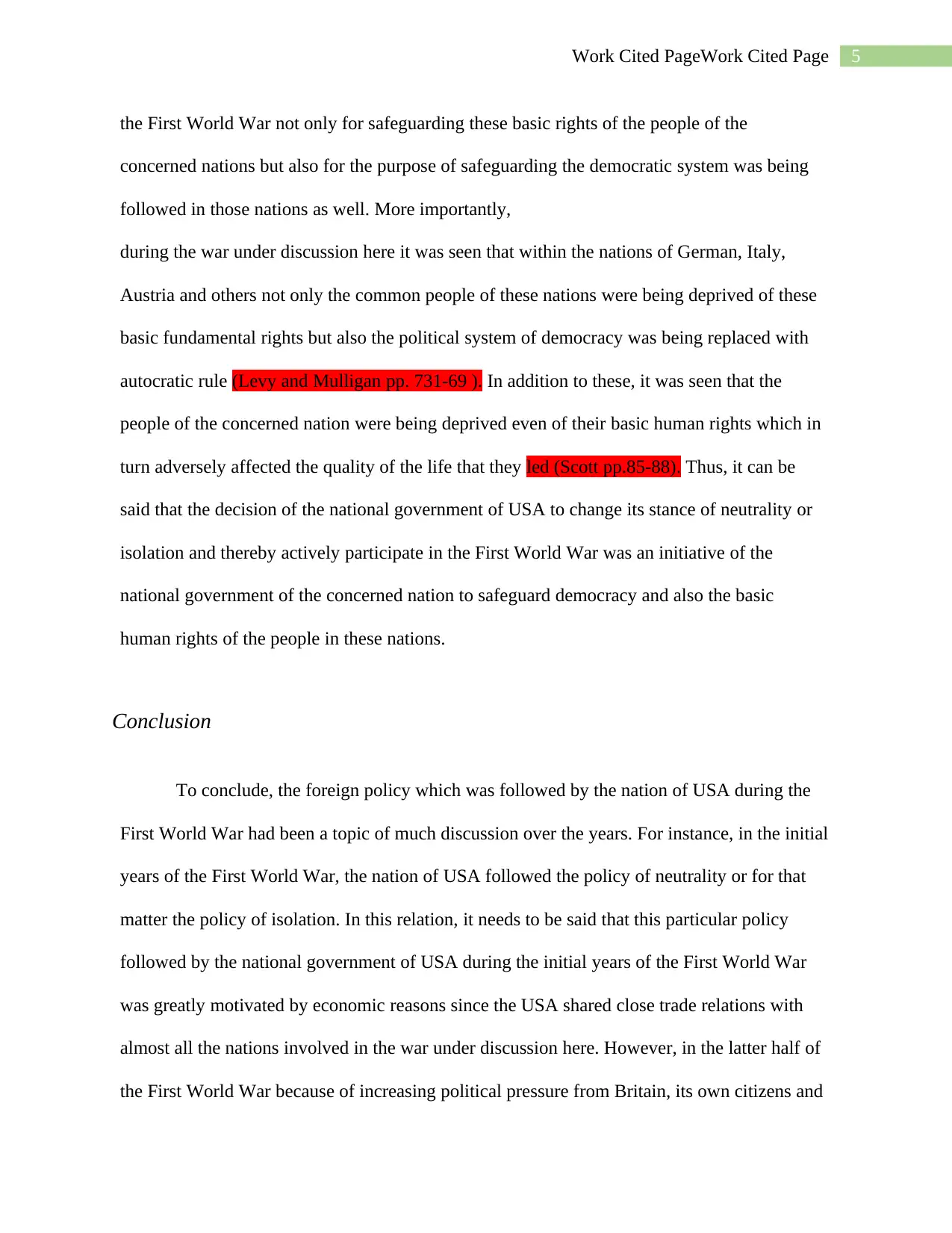
5Work Cited PageWork Cited Page
the First World War not only for safeguarding these basic rights of the people of the
concerned nations but also for the purpose of safeguarding the democratic system was being
followed in those nations as well. More importantly,
during the war under discussion here it was seen that within the nations of German, Italy,
Austria and others not only the common people of these nations were being deprived of these
basic fundamental rights but also the political system of democracy was being replaced with
autocratic rule (Levy and Mulligan pp. 731-69 ). In addition to these, it was seen that the
people of the concerned nation were being deprived even of their basic human rights which in
turn adversely affected the quality of the life that they led (Scott pp.85-88). Thus, it can be
said that the decision of the national government of USA to change its stance of neutrality or
isolation and thereby actively participate in the First World War was an initiative of the
national government of the concerned nation to safeguard democracy and also the basic
human rights of the people in these nations.
Conclusion
To conclude, the foreign policy which was followed by the nation of USA during the
First World War had been a topic of much discussion over the years. For instance, in the initial
years of the First World War, the nation of USA followed the policy of neutrality or for that
matter the policy of isolation. In this relation, it needs to be said that this particular policy
followed by the national government of USA during the initial years of the First World War
was greatly motivated by economic reasons since the USA shared close trade relations with
almost all the nations involved in the war under discussion here. However, in the latter half of
the First World War because of increasing political pressure from Britain, its own citizens and
the First World War not only for safeguarding these basic rights of the people of the
concerned nations but also for the purpose of safeguarding the democratic system was being
followed in those nations as well. More importantly,
during the war under discussion here it was seen that within the nations of German, Italy,
Austria and others not only the common people of these nations were being deprived of these
basic fundamental rights but also the political system of democracy was being replaced with
autocratic rule (Levy and Mulligan pp. 731-69 ). In addition to these, it was seen that the
people of the concerned nation were being deprived even of their basic human rights which in
turn adversely affected the quality of the life that they led (Scott pp.85-88). Thus, it can be
said that the decision of the national government of USA to change its stance of neutrality or
isolation and thereby actively participate in the First World War was an initiative of the
national government of the concerned nation to safeguard democracy and also the basic
human rights of the people in these nations.
Conclusion
To conclude, the foreign policy which was followed by the nation of USA during the
First World War had been a topic of much discussion over the years. For instance, in the initial
years of the First World War, the nation of USA followed the policy of neutrality or for that
matter the policy of isolation. In this relation, it needs to be said that this particular policy
followed by the national government of USA during the initial years of the First World War
was greatly motivated by economic reasons since the USA shared close trade relations with
almost all the nations involved in the war under discussion here. However, in the latter half of
the First World War because of increasing political pressure from Britain, its own citizens and
⊘ This is a preview!⊘
Do you want full access?
Subscribe today to unlock all pages.

Trusted by 1+ million students worldwide
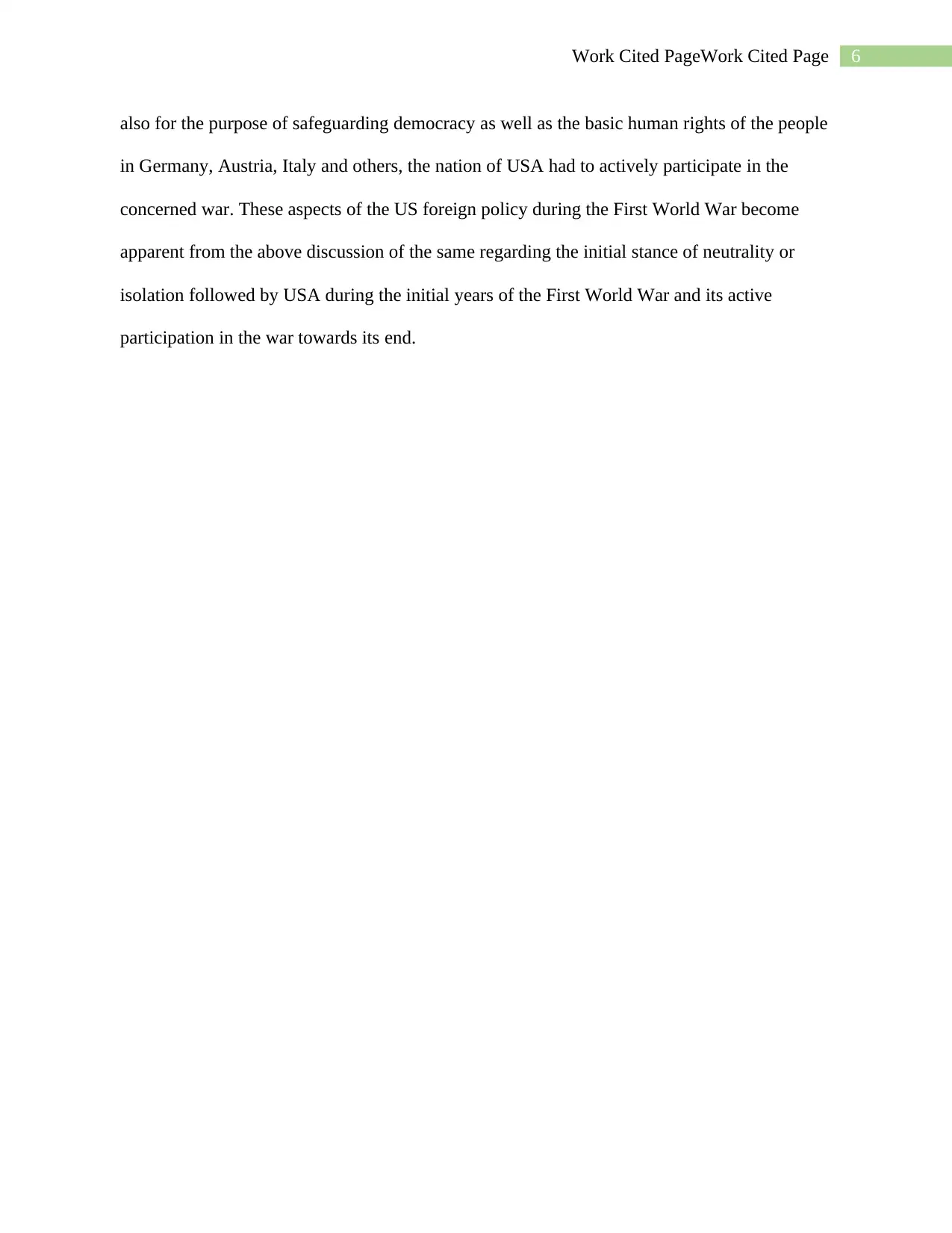
6Work Cited PageWork Cited Page
also for the purpose of safeguarding democracy as well as the basic human rights of the people
in Germany, Austria, Italy and others, the nation of USA had to actively participate in the
concerned war. These aspects of the US foreign policy during the First World War become
apparent from the above discussion of the same regarding the initial stance of neutrality or
isolation followed by USA during the initial years of the First World War and its active
participation in the war towards its end.
also for the purpose of safeguarding democracy as well as the basic human rights of the people
in Germany, Austria, Italy and others, the nation of USA had to actively participate in the
concerned war. These aspects of the US foreign policy during the First World War become
apparent from the above discussion of the same regarding the initial stance of neutrality or
isolation followed by USA during the initial years of the First World War and its active
participation in the war towards its end.
Paraphrase This Document
Need a fresh take? Get an instant paraphrase of this document with our AI Paraphraser
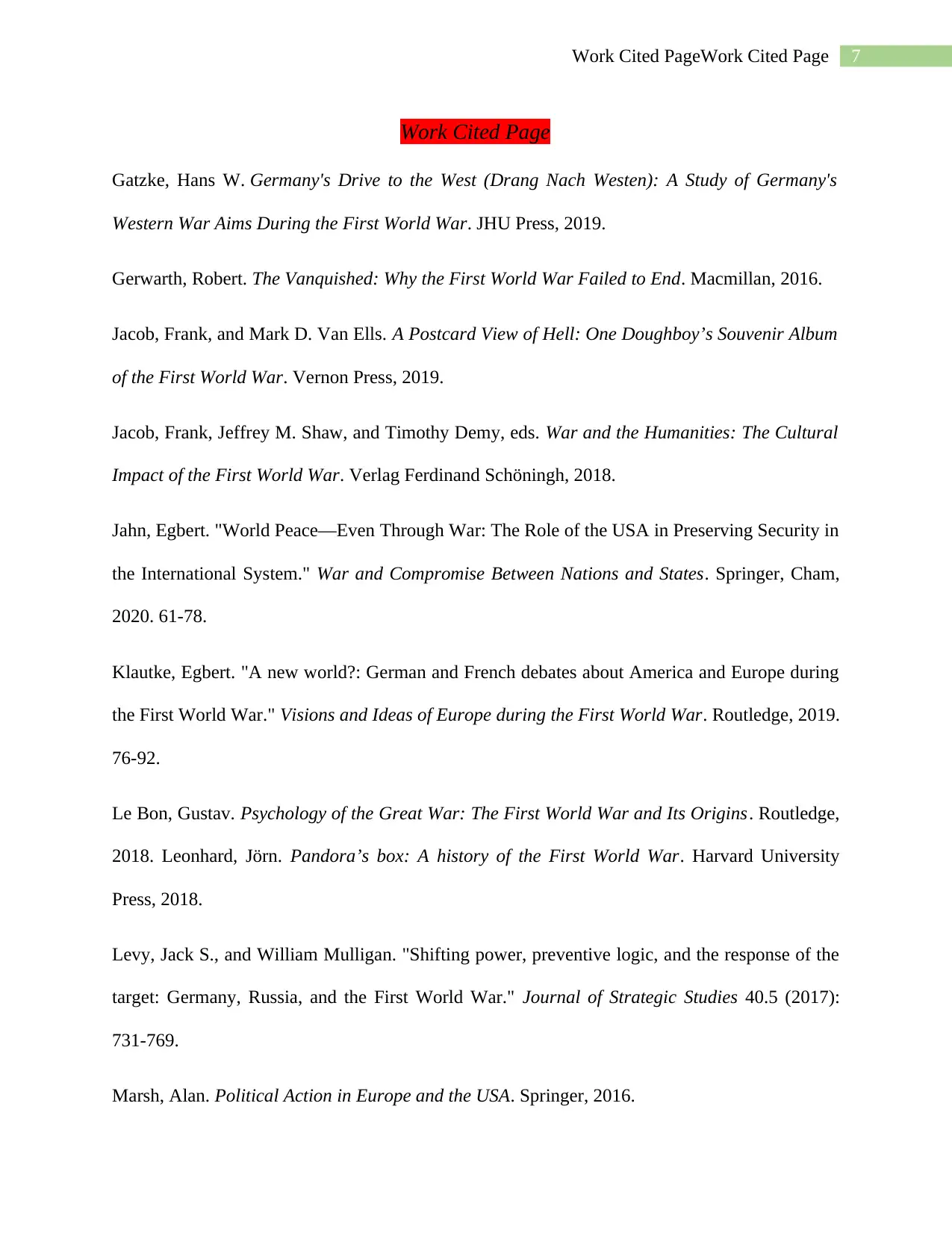
7Work Cited PageWork Cited Page
Work Cited Page
Gatzke, Hans W. Germany's Drive to the West (Drang Nach Westen): A Study of Germany's
Western War Aims During the First World War. JHU Press, 2019.
Gerwarth, Robert. The Vanquished: Why the First World War Failed to End. Macmillan, 2016.
Jacob, Frank, and Mark D. Van Ells. A Postcard View of Hell: One Doughboy’s Souvenir Album
of the First World War. Vernon Press, 2019.
Jacob, Frank, Jeffrey M. Shaw, and Timothy Demy, eds. War and the Humanities: The Cultural
Impact of the First World War. Verlag Ferdinand Schöningh, 2018.
Jahn, Egbert. "World Peace—Even Through War: The Role of the USA in Preserving Security in
the International System." War and Compromise Between Nations and States. Springer, Cham,
2020. 61-78.
Klautke, Egbert. "A new world?: German and French debates about America and Europe during
the First World War." Visions and Ideas of Europe during the First World War. Routledge, 2019.
76-92.
Le Bon, Gustav. Psychology of the Great War: The First World War and Its Origins. Routledge,
2018. Leonhard, Jörn. Pandora’s box: A history of the First World War. Harvard University
Press, 2018.
Levy, Jack S., and William Mulligan. "Shifting power, preventive logic, and the response of the
target: Germany, Russia, and the First World War." Journal of Strategic Studies 40.5 (2017):
731-769.
Marsh, Alan. Political Action in Europe and the USA. Springer, 2016.
Work Cited Page
Gatzke, Hans W. Germany's Drive to the West (Drang Nach Westen): A Study of Germany's
Western War Aims During the First World War. JHU Press, 2019.
Gerwarth, Robert. The Vanquished: Why the First World War Failed to End. Macmillan, 2016.
Jacob, Frank, and Mark D. Van Ells. A Postcard View of Hell: One Doughboy’s Souvenir Album
of the First World War. Vernon Press, 2019.
Jacob, Frank, Jeffrey M. Shaw, and Timothy Demy, eds. War and the Humanities: The Cultural
Impact of the First World War. Verlag Ferdinand Schöningh, 2018.
Jahn, Egbert. "World Peace—Even Through War: The Role of the USA in Preserving Security in
the International System." War and Compromise Between Nations and States. Springer, Cham,
2020. 61-78.
Klautke, Egbert. "A new world?: German and French debates about America and Europe during
the First World War." Visions and Ideas of Europe during the First World War. Routledge, 2019.
76-92.
Le Bon, Gustav. Psychology of the Great War: The First World War and Its Origins. Routledge,
2018. Leonhard, Jörn. Pandora’s box: A history of the First World War. Harvard University
Press, 2018.
Levy, Jack S., and William Mulligan. "Shifting power, preventive logic, and the response of the
target: Germany, Russia, and the First World War." Journal of Strategic Studies 40.5 (2017):
731-769.
Marsh, Alan. Political Action in Europe and the USA. Springer, 2016.
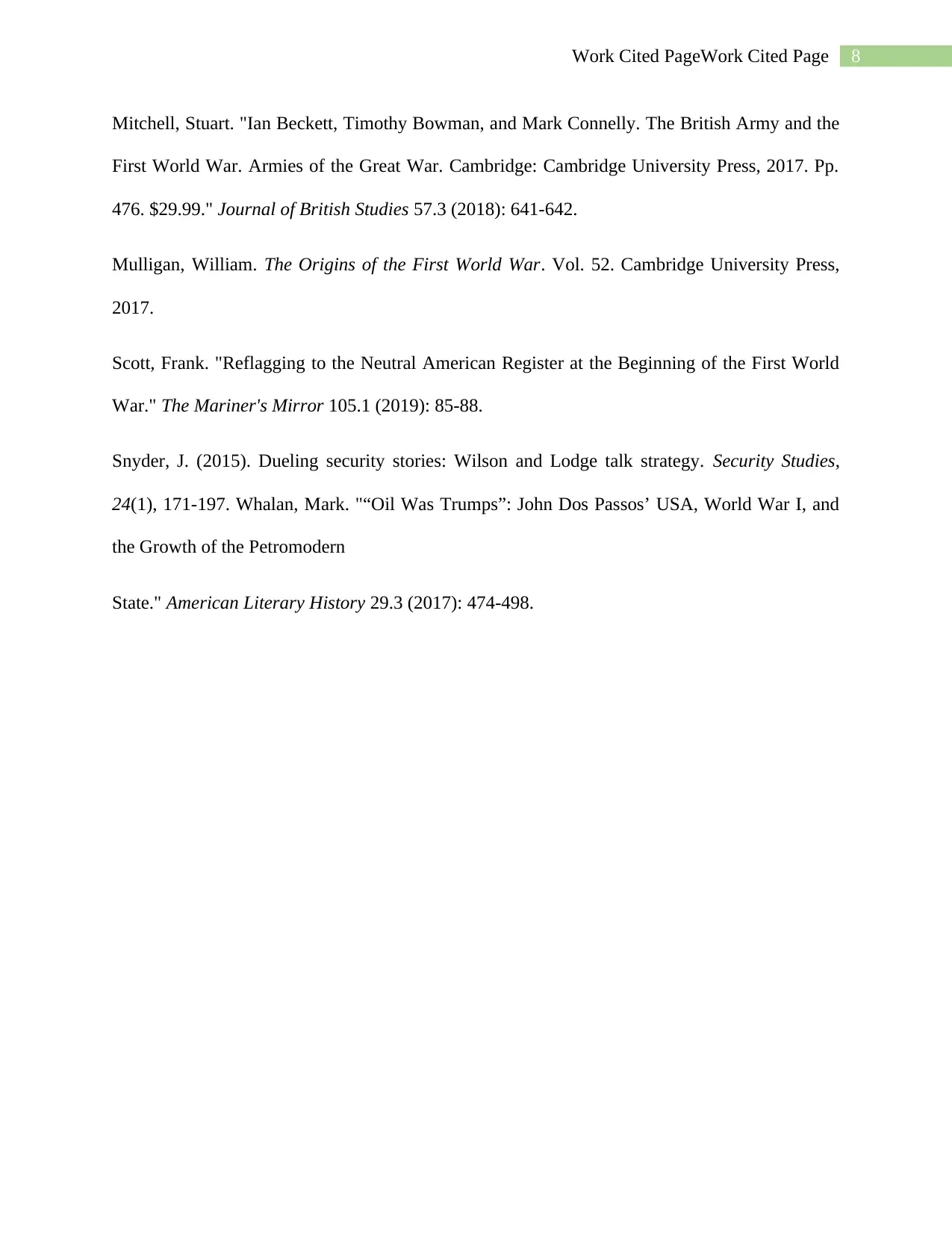
8Work Cited PageWork Cited Page
Mitchell, Stuart. "Ian Beckett, Timothy Bowman, and Mark Connelly. The British Army and the
First World War. Armies of the Great War. Cambridge: Cambridge University Press, 2017. Pp.
476. $29.99." Journal of British Studies 57.3 (2018): 641-642.
Mulligan, William. The Origins of the First World War. Vol. 52. Cambridge University Press,
2017.
Scott, Frank. "Reflagging to the Neutral American Register at the Beginning of the First World
War." The Mariner's Mirror 105.1 (2019): 85-88.
Snyder, J. (2015). Dueling security stories: Wilson and Lodge talk strategy. Security Studies,
24(1), 171-197. Whalan, Mark. "“Oil Was Trumps”: John Dos Passos’ USA, World War I, and
the Growth of the Petromodern
State." American Literary History 29.3 (2017): 474-498.
Mitchell, Stuart. "Ian Beckett, Timothy Bowman, and Mark Connelly. The British Army and the
First World War. Armies of the Great War. Cambridge: Cambridge University Press, 2017. Pp.
476. $29.99." Journal of British Studies 57.3 (2018): 641-642.
Mulligan, William. The Origins of the First World War. Vol. 52. Cambridge University Press,
2017.
Scott, Frank. "Reflagging to the Neutral American Register at the Beginning of the First World
War." The Mariner's Mirror 105.1 (2019): 85-88.
Snyder, J. (2015). Dueling security stories: Wilson and Lodge talk strategy. Security Studies,
24(1), 171-197. Whalan, Mark. "“Oil Was Trumps”: John Dos Passos’ USA, World War I, and
the Growth of the Petromodern
State." American Literary History 29.3 (2017): 474-498.
⊘ This is a preview!⊘
Do you want full access?
Subscribe today to unlock all pages.

Trusted by 1+ million students worldwide
1 out of 9
Related Documents
Your All-in-One AI-Powered Toolkit for Academic Success.
+13062052269
info@desklib.com
Available 24*7 on WhatsApp / Email
![[object Object]](/_next/static/media/star-bottom.7253800d.svg)
Unlock your academic potential
Copyright © 2020–2026 A2Z Services. All Rights Reserved. Developed and managed by ZUCOL.





